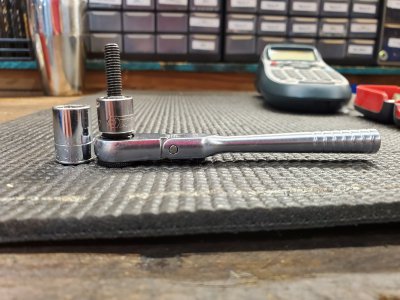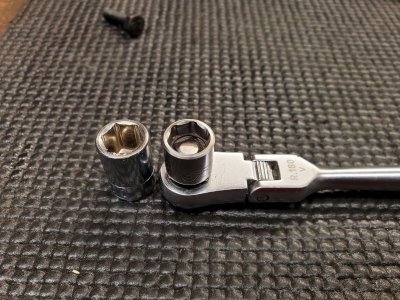This thread seems to have stirred up several emotions. I love it. . . One of the reasons I do machine work is to make/modify tooling to fit my needs. The Torx bits are machine friendly, and as an electrician/electronics repairman agree there are places where the average consumer shouldn't go. They will often do more even more damage by trying to "jerry-rig" something to get it to work again.
Consumers aside, I use very small fasteners quite often. Has anyone priced an 0.035 spintight (nut driver)? I can tell you they don't come cheap, if you can even find one these days. I make mine in those sizes with a socket head screw by fitting a handle and turning down the screw head. If I need a deep reach, I drill and tap the end of a rod. I buy brass brazing rod in large packages for the purposes of making stuff. And have a good supply of steel rod. Hex (Allen) drivers the same way. A cheap set of Allen wrenches with the offset head cut off and a piece of steel rod makes a deep reach socket driver.
Torx particularly, but many other drivers get modified by turning down the hex shape and drilling/tapping the drive end for an extension rod. Depending on size or frequency of need, I may make a handle or just fold over the other end of the rod in a loop. Such tools may well not last very long. So what? I made it once, so just make it again. I have dozens of "specialty" tools that have been made this way. It's a large part of what got me into doing lathe work. The tools aren't very pretty, and often don't last long. But they work this one time, if they don't hold up to a second or third use, I'll make another.
I'm not recommeding this approach for a working shop, but for the casual user it's a definate headache solution. Horrible Fright tools, as a rule, are cheap and usually less strong material. They can be drilled and cut down to fit an application where US made tools are not so easy. A "security torx" driver is easy. Just drill a shallow hole in the business end.
Buying those cheap hex bits, 3 or 4 packages at a time, leaves me with working stock just sitting on a shelf. And reusing. . . Any good framing carpenter knows how fast screwdriver tips wear out. Instead of chucking them out, save to make something else out of. Yes, it takes a long time, but that's what retirement is for. Those long projects. . . And when was the last time you used your dividing head? Having a small machine shop at my disposal is much more than just making model steam engines or fixing my tractor. It's about doing what I do at my convenience, not a search engine or shipping ststem.
.






